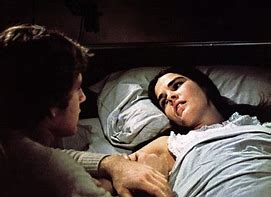I knew cancer would be scary and life-altering. But I didn’t know it’s also be so musical and dramatic.
I was diagnosed with Breast cancer in 2017. And my Type A personality took the news and ran with it into all kinds of worst-case scenario directions. There’s no denying cancer amplifies the sheer drama of life, death, l’amour, loss.
And, if you are a drama queen like yours truly, the heightened effect will show probably up in the music and films you ingest.
Observe.
A song like “It’s All Coming Back To Me Now,” whether Celine Dion or Meatloaf belts it out, is a “danger: high voltage” song for the diagnosed and their loved ones. I identified with it immediately.
In both music video versions of this song, this epic scale of mansions, candelabras, thunderstorms and the haunting presence of the departed on the lover left behind, can send one into over-the-top- drama. It sent me there, anyway. I just superimposed my husband into the song/video. Extreme caution here.
And then there’s Queen. Two heart-wrenching sob fests include, “Who Wants to Live Forever?” and “These are the Days of Our Lives.”
“Who Wants to Live Forever?” was written specifically for the 1980s film, “The Highlander.” The movie’s theme deals with an immortal man who becomes all-knowing and all-powerful. The downside? Even though he cannot die, he is not invulnerable to losing people he loves; he has to watch them die, one by one, as each era passes away. Living forever means little if you have to endure it without the loved ones who mean the most to you.
“These are the Days of Our Lives,” likewise, is another soul-ripper.
Again, written and performed by Queen, it is probably best known as lead singer, Freddie Mercury’s last recording before he succumbed to HIV in 1991. Its lyrics are every bit the reflective, end-of-life thoughts about, spoiler alert: meaningful love relationships.
Again, use caution viewing the dramatic, black and white music video. With Mercury at his most emaciated, it is a stark portrayal of reality, especially when that reality is “I’m going to die and I love you.”
My husband is at the epicenter of these lyrics every time I hear the song.
They say music is a spirit, one which teleports us, seduces us, inspires us. And I think there’s a lot of truth to that. How many of us can remember where we were and what was happening whenever we hear a particular song?
But all of this drama is not limited to music. Oh, Heavens, no! We must not forget the genre of film.
I have my go-to tear-jerkers: “Love Story,” “Wuthering Heights” (the 1930s Lawrence Olivier and Merle Oberon version) and “Terms of Endearment.” No surprise here, the theme is someone dying and some element of deep, abiding and tortuous love. So much fun. Where’s the popcorn? We need popcorn and Junior Mints.
Film doesn’t register nearly as intensely as music does for me in this capacity, but it does register. It has to deal with identifying, the main goal of any filmmaker telling his/her story. Grab that audience; make them identify with and feel your characters. Films about love and loss corner the market on that objective.
Since my diagnosis, music and film are not utilized just so I can make myself cry and feel bad about my circumstances. No. Rather, through the filter of the lyricist or character, I can explore my own cancer realities. What would I do if I were this film’s particular person? And it’s not always the dying character, either. It’s also those who are the left behind.
For me, there is a therapeutic value to going to these dramatic resources. Music and film serve as conduits. They trigger and awaken.
Am I a glutton for punishment? Possibly.
But, I think it has more to do with processing. I’m tapping into questions, potential realities and attempting to face my situation. Yes, I often use my imagination (uh-oh) and think about my husband. How’s he doing? What would his reaction be if/when I died?
But it’s more than that. It is the realization that I may be nowhere near coming to terms with and experiencing all I will go through, concerning cancer. And recognizing, when, not if, we will be separated is frightening.
It’s easier to accept that if death is a lon-n-n-n-g way off. It’s more painful if it’s coming quicker, and without asking for any permission.
I’m trying- and have tried- to have conversations with my husband about these film-and-music-inspired mortality thoughts. He runs for the hills whenever he can. No, it’s actually just the nearest parking lot. But, not surprisingly, it’s not his favorite subject matter. However, what if we do need to go there? What then?
Real questions. Real possibilities. Not just a song or a movie.
What about you? Can you examine the possibilities, the variety of outcomes? Can you process, face, make meaningful sense of and accept what is happening to you in your life?
Really? All of this from a song? All of this from a movie?
Well, for me, yes. And maybe, for you as well.
If that is the case, I encourage you, dear reader, to not berate yourself for it. Use it as therapy; use it as self-care. Use it to confront and soothe. Use these avenues of expression in whatever ways you need to.
Your life is very much an important song, very much an important movie. And you are the diagnosed star.
Copyright © 2019 by Sheryle Cruse












Read 0 comments and reply